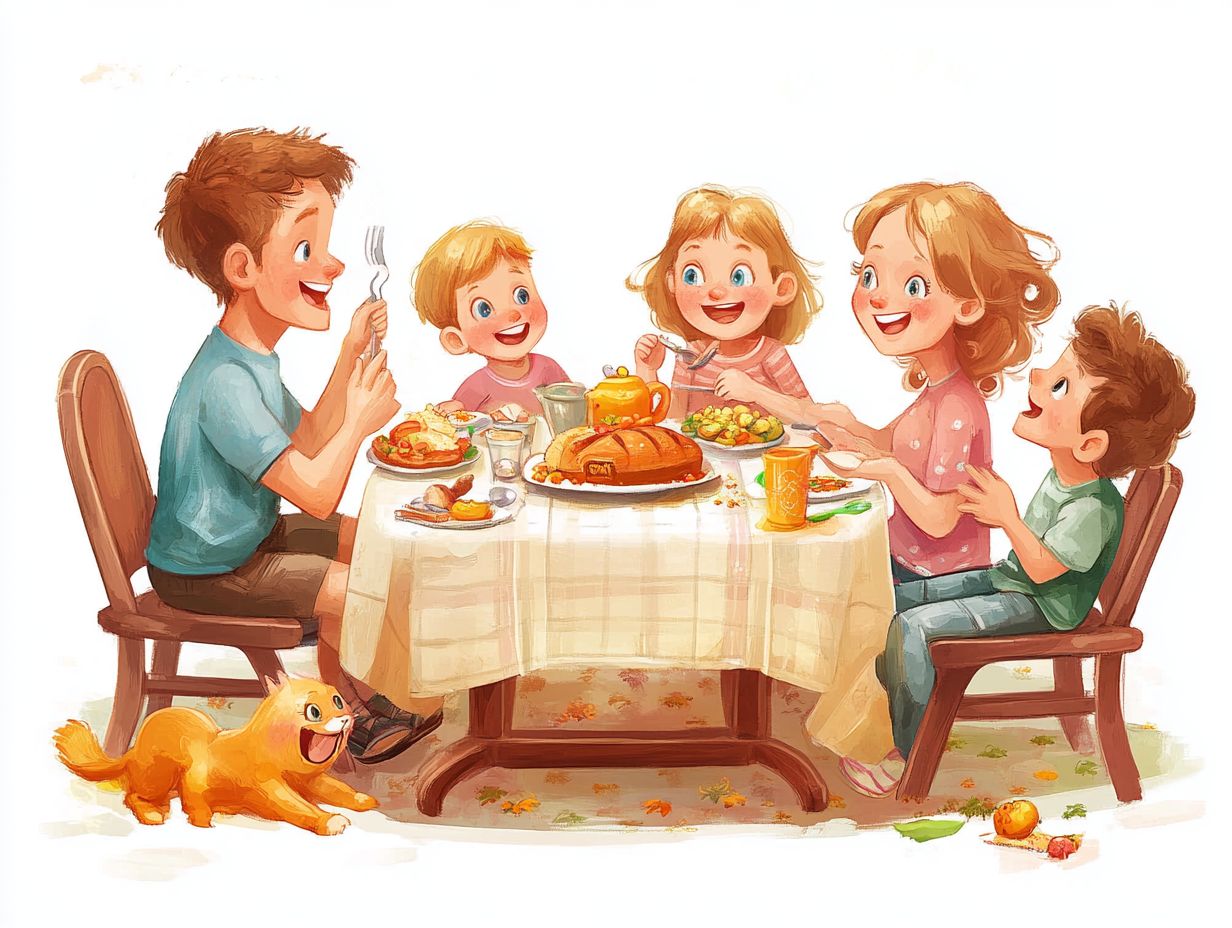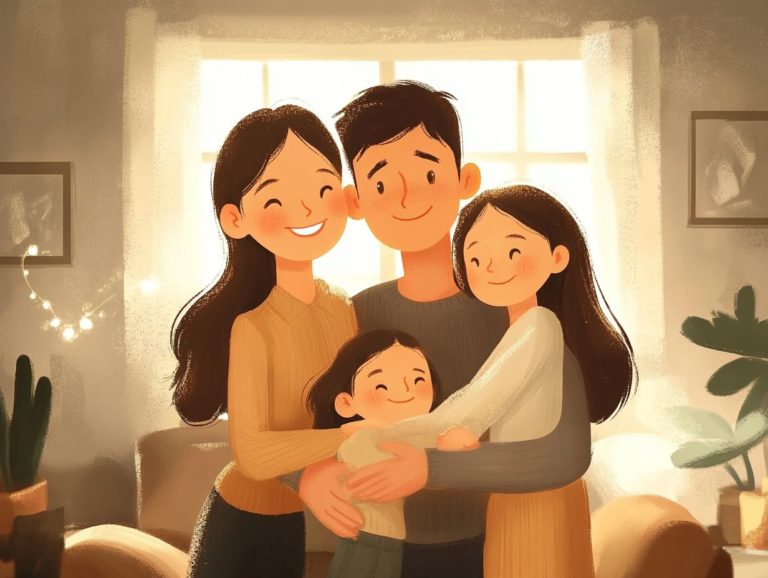Creating Traditions to Enhance Family Bonds
Family traditions are the threads that intricately weave your family’s tapestry, cultivating shared experiences and cherished memories. They act as a sturdy foundation for family values and connections, reinforcing bonds and nurturing a profound sense of belonging, contributing to a strong family identity.
In this exploration, you’ll delve into the essence of family traditions, uncovering their profound significance and learning how to craft meaningful customs that resonate with everyone involved, including adoptive families.
From festive holiday celebrations to the warmth of weekly dinners, you’ll discover a variety of traditions that can enrich family life, build character, and elevate relationships to new heights.
Contents
- Key Takeaways:
- What Are Family Traditions?
- How to Create Family Traditions?
- What Are Some Examples of Family Traditions?
- How Do Family Traditions Enhance Family Bonds and Family Relationships?
- Frequently Asked Questions
- What are the benefits of family traditions?
- How can families create traditions to enhance their bonds?
- What are some examples of traditions for family dynamics?
- How do traditions help build family identity and unity?
- What should families consider when creating traditions?
- Can traditions improve family relationships and mental health?
Key Takeaways:

- Family traditions create a sense of belonging and provide stability for families, playing a crucial role in building character and promoting mental health.
- Involving everyone in the planning process and making traditions personal and meaningful strengthens family bonds and improves family communication.
- Whether it’s holiday traditions or weekly dinners, family traditions foster communication, build relationships, and create lasting memories, ultimately supporting family health.
What Are Family Traditions?
Family traditions are the cherished practices and rituals that you inherit through the generations, playing a vital role in defining your family identity and nurturing a profound sense of belonging among its members. These traditions often form a crucial part of family history and heritage.
These traditions from your childhood do much more than celebrate your heritage; they serve as a cornerstone for emotional connections, strengthening the family bonds that tie your family together. Whether it s through heartfelt storytelling, shared meals, or those beloved annual family vacations, these customs not only create lasting memories but also deepen your understanding of the intricate dynamics within your family.
Why Are Family Traditions Important?
Family traditions hold immense importance for your emotional well-being, providing a robust framework of support that strengthens relationships and fosters a sense of family stability. These cherished rituals enhance your family s involvement, creating opportunities for shared experiences that celebrate holiday traditions and special occasions. In doing so, they build trust and reinforce the bonds that connect you.
According to insights from the American Psychological Association, engaging in these customs can significantly boost self-esteem among family members, especially children, by instilling a strong sense of identity and continuity. Marshall Duke and Robyn Fivush’s research also emphasizes the value of storytelling in building self-esteem. Research highlighted in the Journal of Family Psychology reveals that regular family gatherings and rituals contribute to a deeper sense of belonging, offering a consistent environment where each individual feels valued and understood. Contributions from researchers like Barbara H. Fiese and Ann Buchanan of the University of Oxford further substantiate these findings.
This structured approach to family life not only nurtures emotional connections but also acts as a protective factor against stress and uncertainty, contributing to overall family health and mental health. It reinforces the notion that family traditions can indeed be a powerful tool for promoting overall psychological health.
How to Create Family Traditions?
Creating family traditions demands intentional planning and a deep commitment to understanding your family’s values and navigating family challenges. These core beliefs serve as the foundation for developing meaningful rituals and special activities that everyone can enjoy.
By integrating consistent family routines and cultural traditions, you can cultivate a predictable environment that not only fosters connection but also facilitates the creation of lasting family memories.
1. Identify Values and Interests
Identifying your family s values and interests is the cornerstone of crafting meaningful family traditions and strengthening family dynamics. This foundational step paves the way for bonding experiences that resonate with each family member, ultimately enhancing your family dynamics.
By engaging in open conversations about what matters most to each individual, you can cultivate deeper emotional connections and foster trust among family members, which is essential for effective family communication. This exploration of unique passions, beliefs, and priorities ensures that everyone feels heard and valued.
Regular discussions allow your family not only to share interests but also to navigate differences, celebrating each member s individuality and enhancing family dynamics. Such inclusive communication creates a safe space where everyone can express themselves freely, enriching your family unit and improving the quality of relationships within it.
2. Involve Everyone in the Planning Process
Involving every family member in the planning process is essential for fostering a sense of family involvement and ensuring that traditions resonate with the collective interests and preferences, ultimately promoting family unity. This approach cultivates a stronger sense of family unity and shared experiences.
Encouraging open communication allows everyone from the youngest child to the oldest relative to share their unique perspectives and ideas. For instance, when discussing holiday traditions, you might invite the children to weigh in on activities, like crafting handmade decorations or selecting a special meal. This not only empowers younger family members but also ensures that the traditions hold meaning for everyone involved, including new partners in the family.
Regular family meetings can become an invaluable platform for sharing thoughts on enhancing your annual traditions and holiday celebrations. This collaborative spirit results in traditions that naturally evolve with your family s growth. Such engagement doesn t just strengthen bonds; it creates lasting memories that enrich each member s connection to the family legacy.
3. Start Small and Build Up

Starting small when you establish family traditions is a brilliant strategy for creating family rituals. It allows you to gradually integrate new practices into your routine, making the whole process more manageable and predictable as these traditions take root over time.
As you embark on the delightful journey of creating rituals, the key is to focus on simple, enjoyable activities, such as family meals, that don’t require significant resources or hefty time commitments. For example, kicking off a weekly game night can foster a sense of togetherness without overwhelming anyone in the family.
Once these smaller traditions start to gain traction, you can get creative and explore ways to expand them perhaps by introducing themed nights, family activities, or rotating hosting duties. This organic growth nurtures a sense of ownership and excitement, ensuring that everyone feels involved and appreciated in your evolving family culture.
To maintain consistency, setting specific times for these traditions can help reinforce their significance while still allowing for a bit of spontaneity. This predictability contributes to the overall sense of family stability and further enriches the family experience, making those moments together all the more special.
4. Make It Personal and Meaningful
Making family traditions personal and meaningful is crucial for crafting lasting memories that resonate with everyone in your family. This includes creating emotional connections through shared experiences. These experiences can be tailored to reflect your unique family history and storytelling, enriching the tradition in ways that are truly special and honoring family traditions.
By weaving in anecdotes from the past, each generation can share their unique narratives that celebrate your family’s shared values, beliefs, and milestones. Scholars like Sara Duke emphasize the importance of storytelling in these narratives. This not only honors the past but also deepens the emotional bonds between relatives.
Incorporating elements of cultural heritage, like traditional recipes or customs that are unique to your background, can add even more depth to these traditions. It invites younger family members to engage actively and carry on the legacies.
Encouraging everyone to share their stories whether at festive gatherings or casual family dinners creates an atmosphere of belonging and recognition. This fosters profound family connections. Doing this helps your family create meaningful experiences that will be cherished for years, creating a rich tapestry of shared memories.
5. Be Flexible and Open to Change
Being flexible and open to change is essential when you’re crafting family traditions. Family dynamics evolve over time, and adapting those traditions ensures they remain relevant and meaningful for everyone involved.
As your family grows and develops whether through marriage, the arrival of children, or the introduction of new partners take a fresh look at your family traditions to keep them exciting and relevant! It’s important to look at family traditions again.
For example, a yearly gathering that once revolved around a specific holiday meal can easily shift to include new dishes that reflect diverse cultural backgrounds or accommodate dietary preferences. Research by the Nebraska Children s Home Society supports such adaptability. This adaptability not only honors the new members but also strengthens your family bonds by embracing everyone’s unique contributions.
Incorporating activities that resonate with younger generations, like game nights or movie marathons, allows you to preserve the essence of the original tradition while catering to evolving interests. Ultimately, these adjustments foster a sense of inclusivity, ensuring that all voices are heard and that the traditions remain a source of joy and connection for everyone.
What Are Some Examples of Family Traditions?
Family traditions manifest in various ways, encompassing everything from festive holiday celebrations and lively family reunions to cherished weekly game nights and memorable annual vacations, each offering unique psychological benefits. Each tradition serves as a reflection of the distinctive dynamics and values that define your family unit.
1. Holiday Traditions
Holiday traditions are a vibrant celebration of family connections and family heritage. They invite you to gather with loved ones and forge emotional bonds through shared rituals and festive activities.
These occasions do more than just encourage togetherness; they create lasting memories that you and your family will cherish for generations to come. Take Thanksgiving, for example, where loved ones gather around the dinner table to indulge in a feast of turkey and pie, all while emphasizing gratitude and reflection.
Christmas, on the other hand, brings its own unique traditions, like decorating the tree or exchanging handmade gifts. This inspires creativity and cooperation among family members. Celebrations like Diwali and Hanukkah bring unique customs, including the lighting of candles and sharing traditional foods. They immerse you and your family in your heritage while strengthening your cultural identity.
These diverse practices not only enrich your holiday experience but also deepen the bonds within your family, creating a profound sense of belonging, family identity, and shared history.
2. Family Game Nights
Family game nights offer delightful opportunities for bonding that inspire friendly competition, laughter, and teamwork. They enrich the family dynamic through shared experiences.
These gatherings establish a relaxed atmosphere where you and your loved ones can engage meaningfully. This often leads to deeper discussions and greater understanding among family members.
Whether you opt for classic board games like Monopoly and Scrabble, cooperative card games like Uno, or modern favorites such as Codenames and Ticket to Ride, the variety of options ensures that everyone can participate and contribute.
To elevate your game night, choose games that cater to the interests and abilities of all players, ensuring that everyone feels included and valued. Adding snacks and comfortable seating enhances the experience, transforming these game nights into cherished family traditions.
3. Weekly Family Dinners

Weekly family dinners offer you a crucial opportunity to connect with loved ones over shared meals, creating a stable environment and enhancing family communication.
These gatherings light up the room with warmth and laughter. They encourage open dialogue, allowing everyone to share their experiences, thoughts, and emotions.
The simple act of sharing food not only nourishes the body but also builds lasting memories and traditions. Engaging in discussions during meals strengthens relationships among family members and promotes a deeper understanding of each other’s lives.
Here are some simple ideas to make your dinners special:
- Preparing favorite family recipes
- Incorporating fun themes
- Designating one night each week as a technology-free zone to encourage undistracted interaction
Setting a beautiful table can transform the dining experience, making everyone feel valued and appreciated.
4. Annual Family Trips and Family Vacations
Annual family trips become a cherished tradition that allows you and your loved ones to explore new destinations together. This crafts shared experiences that foster lasting memories and strengthen family unity.
These adventures whether they take the form of road trips to national parks, relaxing beach getaways, or cultural excursions to vibrant cities enhance the bonds among family members. When you embark on journeys to popular destinations like Disney World, the Grand Canyon, or the serene beaches of Hawaii, you engage in thrilling activities and meaningful conversations that deepen your connections.
Traveling together promotes teamwork and encourages open communication. It cultivates a sense of belonging as everyone collaborates to navigate new experiences. Ultimately, these shared moments become the cornerstones of family life, enriching your relationships and establishing a foundation of support and love that endures long after the vacations come to an end.
How Do Family Traditions Enhance Family Bonds and Family Relationships?
Family traditions play a vital role in strengthening your family bonds and family relationships. They cultivate a profound sense of belonging, create opportunities for meaningful emotional connections, and forge lasting memories that underscore the importance of family support.
Embracing these traditions truly enriches your family life, deepening the bonds that hold you together and promoting emotional well-being.
1. Creates a Sense of Belonging
Family traditions cultivate a deep sense of belonging, anchoring you and your loved ones to a shared identity and history that is vital for emotional well-being. These rituals be it weekly dinners, holiday celebrations, or storytelling sessions serve as reliable touchstones, offering comfort during challenging moments.
Consider how, when your family gathers every Thanksgiving to share meals and reminisce about past stories, it reinforces your connections and fosters a profound sense of unity. Over time, this sense of belonging can elevate your self-esteem, as you feel valued and understood within the familial framework.
Traditions often flow from one generation to the next, crafting a legacy that fortifies your family s identity while enriching the lives of each member. This shared narrative not only affirms your unique place within the family but also weaves a rich tapestry of connection and support that you can draw on throughout your life.
2. Builds Stronger Relationships
Engaging in family traditions cultivates stronger relationships among family members, enhancing dynamics and establishing vital support systems that enable individuals to navigate life s challenges more effectively. These traditions also bolster family stability and mental health.
These rituals whether it s a weekly game night, holiday dinners, or annual family vacations offer perfect opportunities for bonding and crafting lasting memories. Participating in shared activities encourages open communication, allowing you and your family to express thoughts and feelings in a relaxed environment.
For example, a family grappling with stress might find comfort in a routine movie night, where they can unwind together and address issues in a light-hearted manner. This consistent gathering strengthens trust and understanding, demonstrating that even in tough times, there s a safe space to lean on one another.
3. Provides Stability and Continuity
Embracing family traditions offers you a valuable sense of stability and continuity that enriches your family routines, creating a predictable environment that is essential for emotional health and security. Such traditions also foster family identity and promote mental health.
This predictability fosters a space where each member feels safe and valued, significantly enhancing their mental well-being. During times of change or uncertainty like a move or a family health crisis these reliable rituals serve as grounding forces.
They create a sanctuary for family members to unite, share experiences, and strengthen connections. Participating in shared activities, whether it s family dinners, game nights, or holiday celebrations, nurtures those vital bonds and promotes resilience.
This supportive atmosphere not only enhances emotional health but also cultivates a profound sense of belonging, ultimately laying the foundation for a secure and loving family unit.
4. Fosters Communication and Connection

Family traditions cultivate a rich environment for communication and connection among members, offering a safe haven for sharing thoughts, feelings, and experiences that significantly enhance emotional well-being and trust building.
These cherished rituals provide a perfect opportunity for you and your family to come together, reflect, and actively engage with one another, allowing everyone to express personal stories and weave collective memories. Through the art of storytelling, you bond over shared experiences, fostering empathy and understanding among your relatives.
Take, for example, those holiday gatherings; the narratives about past events can spark laughter and stir nostalgia, creating a beautiful tapestry of emotional ties that strengthen familial relationships. By embracing these time-honored customs, you learn to listen attentively and appreciate each other’s perspectives, further fortifying your connection and nurturing a culture of open dialogue.
5. Creates Lasting Memories
Creating lasting memories through family traditions is essential for creating meaningful experiences that future generations will cherish and uphold. This process helps build a strong family identity.
Shared moments fortify the bonds between family members and instill a profound sense of belonging that can endure for a lifetime. Embracing storytelling, celebrating annual gatherings, and nurturing simple rituals can cultivate unforgettable experiences that resonate deeply with everyone involved.
Consider developing a family scrapbook, engaging in volunteer activities together, or sharing recipes passed down through the generations. These fun activities can create strong emotional bonds that last a lifetime!
By prioritizing these traditions, such as holiday celebrations and childhood practices, you can weave an intricate network of family memories that fosters unity. This ensures your unique family heritage continues to thrive through the years.
Frequently Asked Questions
What are the benefits of family traditions?
Creating traditions strengthens emotional connections and trust among family members. They increase feelings of belonging, self-esteem, security, and improve communication within the family.
How can families create traditions to enhance their bonds?
Families can start by identifying special activities or events that hold meaning for them, such as holiday traditions or annual family vacations. New traditions, like family rituals that reflect their values, can also be created.
What are some examples of traditions for family dynamics?
Examples include having a weekly family game night, cooking a special dish together, or taking a family hike on a specific holiday. Other ideas are family storytelling sessions and family reunions that provide bonding opportunities.
How do traditions help build family identity and unity?
Traditions create shared history and identity. They pass down cultural or religious beliefs, fostering pride, belonging, and emotional well-being.
What should families consider when creating traditions?
Families should consider the interests and emotional well-being of all members, as well as logistics like timing and budget. Being open to adapting traditions as the family grows is also important.
Can traditions improve family relationships and mental health?
Yes, traditions provide opportunities for bonding, communication, and appreciation among family members. They can help resolve conflicts, promote forgiveness, and enhance mental health.






